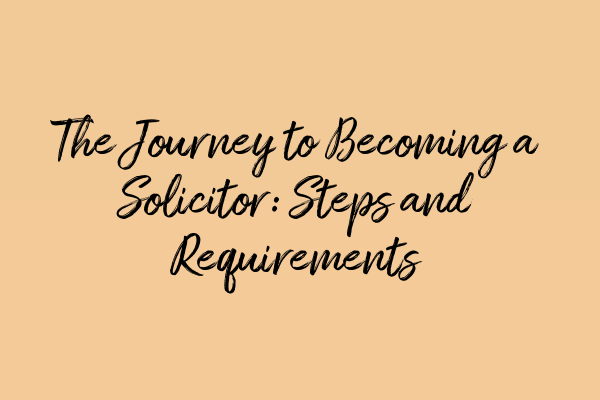The Journey to Becoming a Solicitor: Steps and Requirements
Becoming a solicitor is an exciting and rewarding career path for those interested in the legal profession. Whether you’re fresh out of school or considering a career change, this blog post will guide you through the steps and requirements to become a solicitor in the UK. So, let’s dive in!
Step 1: Obtain the Right Qualifications
The first step in your journey to becoming a solicitor is to obtain the right qualifications. This typically involves completing a law degree (LLB) or any other equivalent qualification recognized by the Solicitors Regulation Authority (SRA). A strong academic background will undoubtedly strengthen your chances of succeeding in this competitive field.
Once you have obtained your law degree, you need to complete the Legal Practice Course (LPC). The LPC is a practical training program designed to provide you with the necessary skills and knowledge to practice as a solicitor. It covers essential subjects such as legal research, writing, drafting, advocacy, and professional conduct.
Step 2: Gain Practical Experience
While obtaining the right qualifications is crucial, practical experience is equally important. To enhance your employability and demonstrate your commitment to the legal profession, gaining work experience is highly recommended.
Consider undertaking a training contract or vacation scheme with a law firm. This will give you the opportunity to work alongside experienced solicitors, gaining practical insights into various areas of law. Additionally, it will allow you to build a network of connections, which may prove beneficial in your future career.
Step 3: Pass the Solicitors Qualifying Exam (SQE)
Starting from September 2021, the traditional route to becoming a solicitor will change with the introduction of the Solicitors Qualifying Exam (SQE). The SQE is a new two-part assessment that all aspiring solicitors must pass to qualify.
The first part of the SQE, known as SQE1, tests candidates on their knowledge and understanding of foundational legal principles. It is a multiple-choice exam that covers topics such as contract law, criminal law, and constitutional law, among others.
After successfully passing SQE1, candidates move on to SQE2, which focuses on practical skills. This part of the exam assesses candidates’ competence in essential areas, including client interviewing, case and matter analysis, legal research, legal writing, drafting, and advocacy.
Preparing for the SQE requires a combination of self-study, revision courses, and practice exams. It’s important to allocate sufficient time and resources to adequately prepare for these assessments.
Step 4: Apply to the SRA for Admission
Once you have successfully completed your law degree, LPC, gained practical experience, and passed the SQE, you are ready to apply for admission to the Solicitors Regulation Authority (SRA). The SRA is the regulatory body responsible for overseeing the qualification and professional conduct of solicitors in England and Wales.
Your application to the SRA will involve submitting various documents, including your academic qualifications, proof of practical experience, and a character and suitability assessment. The SRA will review your application and, if satisfied, grant you admission.
Conclusion
The journey to becoming a solicitor requires dedication, hard work, and perseverance. By obtaining the right qualifications, gaining practical experience, passing the SQE, and successfully applying for admission to the SRA, you can embark on a fulfilling career in the legal profession.
If you’re interested in learning more about specific legal topics, consider reading our related articles:
- Cross-Examination Techniques: Mastering the Art of Questioning
- Private Prosecutions: Exploring Non-Governmental Prosecutions in Criminal Cases
- Ethical Challenges in Criminal Defence: Navigating Dilemmas
- Assault and Battery Laws: Understanding the Legal Parameters
- Understanding Drug-related Offences: Laws and Penalties in the UK


Leave a Reply